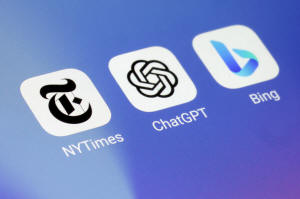NY Times sues OpenAI, Microsoft for infringing copyrighted works
 Send a link to a friend
Send a link to a friend
 [December 28, 2023] By
Jonathan Stempel [December 28, 2023] By
Jonathan Stempel
NEW YORK (Reuters) -The New York Times sued OpenAI and Microsoft on
Wednesday, accusing them of using millions of the newspaper's articles
without permission to help train chatbots to provide information to
readers.
The Times said it is the first major U.S. media organization to sue
OpenAI, creator of the popular artificial-intelligence platform ChatGPT,
and Microsoft, an OpenAI investor and creator of the AI platform now
known as Copilot, over copyright issues associated with its works.
Writers and others have also sued to limit the scraping -- or automatic
collection of data -- by AI services of their online content without
compensation.
The newspaper's complaint, filed in Manhattan federal court, accused
OpenAI and Microsoft of trying to "free-ride on The Times's massive
investment in its journalism" by using it to provide alternative means
to deliver information to readers.
"There is nothing 'transformative' about using The Times's content
without payment to create products that substitute for The Times and
steal audiences away from it," the Times said.
OpenAI and Microsoft have said that using copyrighted works to train AI
products amounts to "fair use," a legal doctrine governing the
unlicensed use of copyrighted material.

On its website, the U.S. Copyright Office says "transformative" uses add
"something new, with a further purpose or character" and are "more
likely to be considered fair."
The Times is not seeking a specific amount of damages, but estimated
damages in the "billions of dollars." It also wants OpenAI and Microsoft
to destroy chatbot models and training sets that incorporate its
material.
Talks to avert a lawsuit and allow "a mutually beneficial value
exchange" with the defendants were unsuccessful, the 172-year-old
newspaper said.
"We respect the rights of content creators and owners," OpenAI said in
an emailed statement. "Our ongoing conversations with the New York Times
have been productive and moving forward constructively, so we are
surprised and disappointed with this development."
Microsoft did not respond to requests for comment.
$80 BILLION VALUATION FOR OPENAI
AI companies scrape information online to train generative AI chatbots,
and have attracted billions of dollars in investments.
Investors have valued OpenAI at more than $80 billion.
While OpenAI's parent is a nonprofit, Microsoft has invested $13 billion
in a for-profit subsidiary, for what would be a 49% stake.
Novelists including David Baldacci, Jonathan Franzen, John Grisham and
Scott Turow have also sued OpenAI and Microsoft in the Manhattan federal
court, claiming that AI systems might have co-opted tens of thousands of
their books.
In July, the comedian Sarah Silverman and other authors sued OpenAI and
Meta Platforms in San Francisco for having "ingested" their works,
including Silverman's 2010 book "The Bedwetter." A judge dismissed most
of that case in November.

[to top of second column] |

NYTimes, ChatGPT and Microsoft Bing app icons are displayed on a
screen in this illustration taken December 27, 2023. REUTERS/Dado
Ruvic/Illustration

The Times filed its lawsuit seven years after the U.S. Supreme Court
refused to revive a challenge to Google's digital library of
millions of books.
A federal appeals court had found that the library, which gave
readers access to snippets of text, amounted to fair use of authors'
works.
"OpenAI is giving the copyright industry a second bite at control,"
said Deven Desai, a professor of business law and ethics at the
Georgia Institute of Technology.
"It's outputs that matter," Desai said. "Part of the problem in
assessing OpenAI's liability is that the company has altered its
products as copyright issues arose. A court could say its outputs at
this moment in time are enough to find liability."
Chatbots have compounded the struggle among major media
organizations to attract and retain readers, though the Times has
fared better than most.
The Times ended September with 9.41 million digital-only
subscribers, up from 8.59 million a year earlier, while print
subscribers fell to 670,000 from 740,000.
Subscriptions generate more than two-thirds of the Times' revenue,
while ads generate about 20% of its revenue.
'MISINFORMATION'
The Times' lawsuit cited several instances in which OpenAI and
Microsoft chatbots gave users near-verbatim excerpts of its
articles.
These included a Pulitzer Prize-winning 2019 series on predatory
lending in New York City's taxi industry, and restaurant critic Pete
Wells' 2012 review of Guy Fieri's since-closed Guy's American
Kitchen & Bar that became a viral sensation.
The Times said such infringements threaten high-quality journalism
by reducing readers' perceived need to visit its website, reducing
traffic and potentially cutting in to advertising and subscription
revenue.
It also said the defendants' chatbots make it harder for readers to
distinguish fact from fiction, including when their technology
falsely attributes information to the newspaper.

The Times said ChatGPT once falsely attributed two recommendations
for office chairs to its Wirecutter product review website.
"In AI parlance, this is called a 'hallucination,'" the Times said.
"In plain English, it's misinformation."
Times general counsel Diane Brayton told staff in an internal memo
that the newspaper recognized the potential of generative AI for
journalism, but "the use of our work to create GenAI tools must come
with permission and an agreement that reflects the fair value of
that work, as the law provides."
The case is New York Times Co v Microsoft Corp et al, U.S. District
Court, Southern District of New York, No. 23-11195.
(Reporting by Jonathan Stempel in New York; Editing by Chizu
Nomiyama, Matthew Lewis and Leslie Adler)
[© 2023 Thomson Reuters. All rights
reserved.]
This material may not be published,
broadcast, rewritten or redistributed.
Thompson Reuters is solely responsible for this content. |